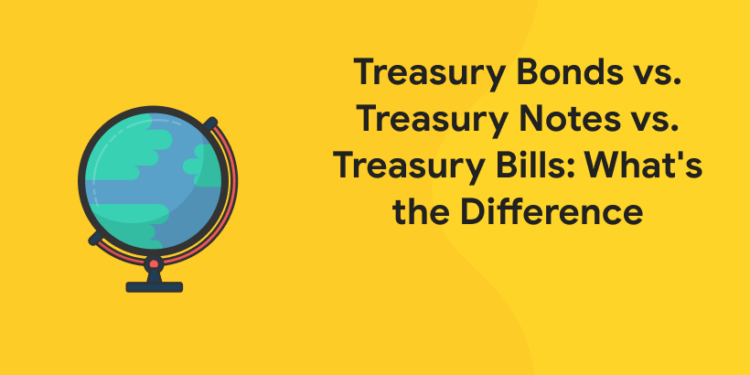Table of Contents
Every government needs money to meet its financial obligations. They approach the public to raise funds. For this purpose, the Government offers different financial instruments like T-bills, Treasury bonds, T-notes, and more. They may be also known as money market instruments, debt securities, bonds, etc. There are a lot of differences between these three financial instruments. One key difference is their maturity period. T-bills or Treasury bills are issued by Government to raise funds for a short-time period of less than one year. Whereas T-Bonds are a long-term capital instrument, that offers the highest interest payments to maturity. They have a maturity of more than 10 years. Similar to T-bonds, T-notes have a maturity of 2-10 years. To know more about this topic, read the article given below, which explains the differences between T-Bills, T-notes, and T-bonds.
Click to learn more about financial instruments
What is a debt instrument?
- It is an investment method that focuses on the preservation of capital and income.
- They are fixed-income assets that legally committed the debtor to provide the money lender interest and principal payment.
- A debt instrument is used as the medium to facilitate debt trading and obligations from one party to another party.
- A debt instrument can be in paper or electronic form, which provides fixed and high returns.
- They may be issued for a long-term or short-term period.
Features of debt instruments
- Treasury bills, notes, and bonds are called “Treasury”.
- No tax deducted at source
- Issued at a discount to their face value
- Safe investment
- High liquidity
- Risk-Free
Click to learn about topics like Treasury Bills,T-bonds and T-notes
Treasury Bills or TBs in India
1: Who was the first woman President of India?
Treasury Bills are money market instruments issued by the Government of India with a maturity of one year. T-bills are short-term borrowing debt instruments that have a maximum maturity of 364 days. Unlike Treasury notes and bonds, T-bills don’t make interest payments. It will be issued at a discount to the original value and the purchaser gets the original value upon maturity. Mainly, Individuals, trusts, institutions, and banks can purchase T-Bills.
Features of T-Bill
- Short-term borrowing instrument.
- T-bills are also known as Zero-Coupon Bonds.
- In 1917, T-Bills, or Depository bills were first issued through auctions conducted by the Reserve Bank of India (RBI).
- The State Government has no right to issue T-bills.
- Interest on the T-bills is determined by the supply and demand of the market.
- Issued in the form of promissory notes with guaranteed repayment at a later date.
- T-bills are finance bills they are different from commercial bills.
- T-Bills market is the place, where the T-bills are bought and sold.
T-Bills are classified in India into three categories:-
- 91 Days
- 182 Days
- 364 Days
Major participants in the T-bills market
- Reserve Bank of India(RBI)
- Mutual Funds
- Financial institutions
- Primary dealers
- Provident funds
- Corporate
- Foreign banks
How to purchase T-bills in India
T-Bills or Depository bills are issued in the primary market through auctions conducted by the Reserve Bank of India (RBI). Two types of bids are accepted:1) non-competitive bid and 2) competitive bid.
- Financial institutions, banks, mutual funds, primary dealers, and insurance companies play a vital role in competitive bids.
- Individuals, HUF/ trust, firm, corporate body, institution, provident funds, and any other parties come under the Non-competitive bidders’ category.
Free UPSKILLING Courses!
Take your first step toward mastering in-demand skills, acing interviews, and securing top-tier jobs with Entri's free upskilling courses.
Start Learning!Treasury Bonds
In simple words, Treasury bonds are a capital market instrument. T-bonds are issued with maturities that can range from 2 years to 30 years. T-bonds are Issued by the government, central banks, or corporate companies. The Government-issued bonds are free from tax at the federal, state, or local level while the corporate bonds are issued with tax.
The longest-term bonds offer the highest coupon payment. Bondholders pay interest every six months. Bonds are mainly classified into government bonds, corporate bonds, zero-coupon bonds, and municipal bonds.
Features
- Long-term capital market instrument.
- High liquid
- Default-free
Treasury Notes
A Treasury note is a US government financial instrument with a fixed interest rate. T-notes have a term of 2, 3, 5, and 10 years of maturity. The interest is paid semi-annually until the maturity period. People can purchase T-notes through a private securities broker, government securities dealer, bank, or other financial institutions.
Differences: Treasury Bills vs. Treasury Notes vs. Treasury Bonds
| Treasury Bills | Treasury Notes | Treasury Bonds |
| Short-term investment | Longer-term than a bill but a shorter term than a bond. | Called T-Bonds are a long-term investment |
| 91 Days,182 Days, and 364 Days | Intermediate-term Treasury security. | Corporate bonds, zero-coupon bonds, and municipal bonds |
| Don’t need to pay interest before maturity. They are sold at a discount rate from face value. | A fixed interest rate is paid semi-annually until the maturity period. | A fixed interest rate is paid semi-annually until the maturity period. |
| Maturity of one year or less. | Issued in terms of two-, three-, five- and 10 years. | Maturity of more than 10 years. |
| The price of T-bills and the return of investors will be affected by various factors like market condition, investor risk profile, inflation, and monetary policy. | The price of the T-notes may fluctuate based on the results of the auction. | The fluctuation in market price will affect several factors, including the maturity date and coupon rate on the bond or the bonds held by the fund or exchange-traded fund (ETF). |












